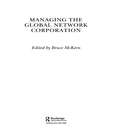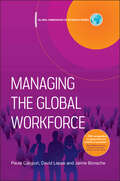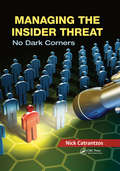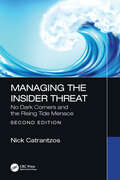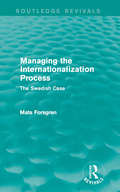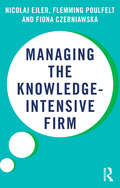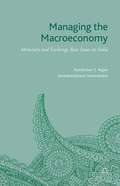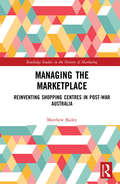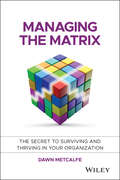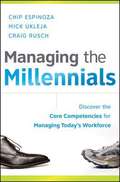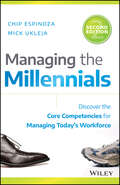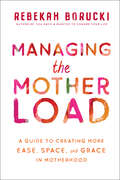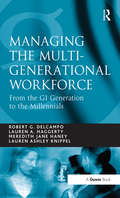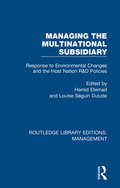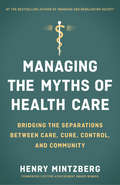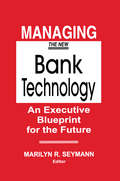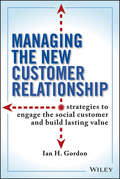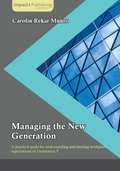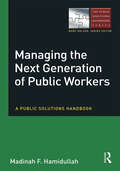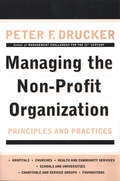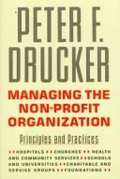- Table View
- List View
Managing the Global Network Corporation
by Bruce McKernAs barriers to international trade and investment have fallen worldwide, multinational enterprises have become the leading engines of economic integration and growth, deploying global strategies to expand their reach. To implement such strategies in an increasingly complex environment, corporations are adopting network forms of organization. This b
Managing the Global Workforce
by Paula Caligiuri David Lepak Jaime BonacheHuman resource management (HRM) is the strategic and coherent approach to the management of an organization's employees. As the need for effective and top staff rises, Managing the Global Workforce provides the most up to date and topical information on accessing human resource management. Written by Paula Caligiuri, an author recognized as one of the most prolific authors in the field of international business for her work in global careers, this book covers the full range of strategic, comparative, and cross-cultural issues affecting the way a workforce is managed globally.
Managing the Growing Venture
by Michael J. RobertsFocuses on the strategic and organizational challenges that confront growing enterprises and the entrepreneurs who lead them.
Managing the Information Mosaic: Designing Information Systems with Managers in Mind
by William J. Bruns Jr. Sharon M. MckinnonThis chapter provides an agenda for future developments in management accounting and information systems, based on the results of a survey about the information needs of managers.
Managing the Insider Threat: No Dark Corners
by Nick CatrantzosAn adversary who attacks an organization from within can prove fatal to the organization and is generally impervious to conventional defenses. Drawn from the findings of an award-winning thesis, Managing the Insider Threat: No Dark Corners is the first comprehensive resource to use social science research to explain why traditional methods fail aga
Managing the Insider Threat: No Dark Corners and the Rising Tide Menace
by Nick CatrantzosManaging the Insider Threat: No Dark Corners and the Rising Tide Menace, Second Edition follows up on the success of – and insight provided by – the first edition, reframing the insider threat by distinguishing between sudden impact and slow onset (aka “rising tide”) insider attacks. This edition is fully updated with coverage from the previous edition having undergone extensive review and revision, including updating citations and publications that have been published in the last decade. Three new chapters drill down into the advanced exploration of rising tide threats, examining the nuanced complexities and presenting new tools such as the loyalty ledger (Chapter 10) and intensity scale (Chapter 11). New explorations of ambiguous situations and options for thwarting hostile insiders touch on examples that call for tolerance, friction, or radical turnaround (Chapter 11). Additionally, a more oblique discussion (Chapter 12) explores alternatives for bolstering organizational resilience in circumstances where internal threats show signs of gaining ascendancy over external ones, hence a need for defenders to promote clearer thinking as a means of enhancing resilience against hostile insiders. Coverage goes on to identify counters to such pitfalls, called lifelines, providing examples of questions rephrased to encourage clear thinking and reasoned debate without inviting emotional speech that derails both. The goal is to redirect hostile insiders, thereby offering alternatives to bolstering organizational resilience – particularly in circumstances where internal threats show signs of gaining ascendancy over external ones, hence a need for defenders to promote clearer thinking as a means of enhancing resilience against hostile insiders. Defenders of institutions and observers of human rascality will find, in Managing the Insider Threat, Second Edition, new tools and applications for the No Dark Corners approach to countering a vexing predicament that seems to be increasing in frequency, scope, and menace.
Managing the Internationalization Process: The Swedish Case (Routledge Revivals)
by Mats ForsgrenFew nations have internationalized their business operations as successfully as the Swedes. This book, first published in 1989, looks at the process in detail, examining the international operations of Swedish firms since 1970, including acquisitions of foreign firms. The international dimension of business is becoming increasingly important for firms of all sizes, and this analysis of what happens when companies enter and then sustain a presence in the international arena will be of great value to students and teachers of international business and management.
Managing the Knowledge-Intensive Firm
by Flemming Poulfelt Fiona Czerniawska Nicolaj EjlerOver the last decade, there has been a substantial rise in the number of knowledge-intensive firms - constituted primarily of professionals. The core assets of these businesses are the people themselves. Handle them badly, and they may defect or stall. Successful managers of knowledge-intensive firms must create meaning among and inspire their employees, to ensure high performance. To achieve this, leaders must understand how to target each employee’s ambitions and challenges to facilitate their personal and professional development. This book examines what sets knowledge-intensive firms apart from other types of organizations, and the resultant organizational and strategic differences in business models, talent management, and client-handling approaches. The authors bring their own complementary perspectives on the subject: one, as the manager of a private consulting firm with a strong research background; another, as a business school professor whose practice-based skills are fundamental to his work; and a third, a world leading commentator on professional service firms acting as a consultant, business school researcher and a manager. Ejler, Poulfelt and Czerniawska present a new model for transforming the management of knowledge-intensive firms, which is supported throughout with practical examples and cases.
Managing the Layoff Process: India
by Sandra J. SucherThis note is an overview of the context for managing layoffs in India. It describes the legal responsibilities of managers in conducting layoffs, recent unemployment trends, and the financial, health, training, job placement and other benefits that laid-off employees can expect to receive.
Managing the Macroeconomy: Monetary and Exchange Rate Issues in India
by Venkataramana Yanamandra Ramkishen RajanWhile offering many growth-enhancing opportunities, India's ever-increasing integration with the world economy has given rise to a host of new challenges in managing the economy. This book provides an up-to-date empirical assessment of some of India's crucial policy challenges pertaining to its monetary and external sector management.
Managing the Marketplace: Reinventing Shopping Centres in Post-War Australia (Routledge Studies in the History of Marketing)
by Matthew BaileyThis book charts the history of Australian retail developments as well as examining the social and cultural dimensions of shopping in Australia. In the second half of the twentieth century, the shopping centre spread from America around the world. Australia was a very early adopter, and produced a unique shopping centre model. Situating Australian retail developments within a broader international and historical context, Managing the Marketplace demonstrates the ways that local conditions shape global retail forms. Knowledge transfer from Europe and America to Australia was a consistent feature of the Australian retail industry across the twentieth century. By critically examining the strengths and weaknesses of Australian retail firms’ strategies across time, and drawing on the voices of both business elites and ordinary people, the book not only unearths the forgotten stories of Australian retail, it offers new insights into the opportunities and challenges that confront the sector today, both nationally and internationally. This book will be of interest to all scholars and practitioners of retail, marketing, business history and economic geography, as well as social and cultural history.
Managing the Matrix
by Dawn MetcalfeA comprehensive guide to excelling in a complex matrix organizationDebra was not in a good mood as she entered Johann's office for their third meeting. One of her colleagues had just been promoted and, although the guy who got it was good, she didn't think he was any better than her. Well, except at one thing, he was always playing politics - sucking up to the more senior guys and volunteering to be on any committee going.Debra knew the type - went to the same school, belonged to the same club - she didn't have a hope against the kind of connections he had so she might as well give up. It seemed doing a good job just wasn't enough around here.Debra and Johann work in an environment with multiple and complex reporting lines - in other words, a matrix. There's room to "slip between the cracks" - if a person wants to take advantage of confusion over who is managing performance; or if they can't make the necessary transition to self-management. Communication can be difficult even when there is an apparently shared language.Read how Johann and Debra work together to identify the skills needed to succeed in a matrix, and how using Emotional Intelligence (EI) can develop specific behaviours you can incorporate in your daily job. The result will help reduce stress and increase your chances of success.Dawn Metcalfe, Managing Director of PDS, based in Dubai, uses her experience as a coach and trainer to give us a behind the curtain look at how mentoring can help an individual develop the skills they need to survive and thrive in today's complex work environments.
Managing the Millennials
by Mick Ukleja Chip Espinoza Craig RuschA valuable tool for anyone who wants to effectively manage and motivate twenty-something workersMany books are being published on how to manage employees of the "millennial" generation, but the solutions offered are anecdotal at best. Backed by years of serious research, Managing the Millennials provides managers of all ages with specific recommendations and tools for engaging this burgeoning demographic-some 78 million strong. Each chapter shares relevant interviews, case studies, and offers research-backed ideas and best practices to help any organization and their leaders address the challenges generational diversity presents.Answering the perplexing question of how does one lead and manage younger employees, this bookOffers research-based guidance on getting the most from twenty-something employeesAnswers common questions and outlines practical solutions for building better relationships between the younger workers and the people who manage themIncludes a Special Offer with immediate benefit to readers: access to the authors' Generational Rapport Inventory (GRI), a tool that measures a managers competencies and identifies strengths and weaknesses in dealing with Millennials.Accompanied by an associate web site, leadingthemillennials.com, offering a weekly blog addressing generational diversity issues in the workplaceInsightful and practical, Managing the Millennials is a valuable tool for millions of managers globally whose job it is to manage and motivate their twenty-something workers.
Managing the Millennials: Discover the Core Competencies for Managing Today's Workforce
by Mick Ukleja Chip EspinozaThe Builders, Baby Boomers, Generation X, and Millennials—all make up workforces in every type of industry all over the world. The generational gaps are numerous and distinctly different between each age group, and Millennials have gotten a reputation for being particularly unique and often challenging. In this updated and expanded Second Edition of the popular guidebook Managing the Millennials, you'll see how Millennial traits are the same around the globe. In fact, Millennials are more alike than any other generation before them due in large part to rapid advances in technology that let us share more experiences together. These same rapid advances are also redefining the fundamental ways businesses operate, and this revised edition includes the international perspective today's valuable leadership needs to attract and retain these high-performing workers with very different values and expectations. With fresh research and new real-world examples, the powerhouse authorial team reexamines the differences between how different generations work today in businesses around the world, with insightful exploration into what makes the Millennial generation so different from the ones that came before. The authors reveal nine specific points of tension commonly arising from clashing value systems among generations and prescribe nine proven solutions to resolve conflict and build communication, nurture collaborative teams, and create long-lasting relationships among colleagues of every age. A wealth of informative tables and convenient end-of-chapter summaries make this an invaluable everyday reference to support you: Making the most informed decisions with up-to-date, research-based guidance on getting the most from twenty-something employees Executing solutions to the most common obstacles to younger workers engaging and learning from the people who manage them Enhancing your skills as a job coach with practical tips and hands-on tools for coaching Millennials, including concrete action steps for overcoming roadblocks Complete with case studies of real managers and employees interacting in every area of business, enlightening analysis of performance and behavioral patterns across generations, and easy-to-use techniques you can use right away to improve your organization, Managing the Millennials, Second Edition gives you everything you need to inspire your entire workforce to new levels of productivity.
Managing the Motherload: A Guide to Creating More Ease, Space, and Grace in Motherhood
by Rebekah BoruckiA candid, humorous, and heartfelt guide to self-care in motherhood from a meditation expert and mother-of-five.Managing the Motherload is a practical system for sanity from a happy, ultra-productive, and sometimes tired mother of five. This five-part system will help readers create a life that they love while allowing all the items on their to-do list to flourish in their own time.In the book, meditation guide and popular YouTuber Rebekah "Bex" Borucki features her favorite healing and stress-reducing modalities, including her signature 4-minute meditations.Deeply personal, heartfelt stories of her struggles and tender moments raising five children are highlighted throughout the book. As a birth doula and meditation guide, Bex offers a wealth of personal and professional experience in managing the demands of motherhood and the need for self-care and stress management."I want every woman who reads this book to come away with a feeling of confidence in finding her own way as a mother and a human being. Upon finishing the pages, the reader will have the know-how to create a path to happiness, freedom, and success that can be achieved not in spite of her tremendous responsibility as a mother but in total alignment with it." -- from the author
Managing the Multi-Generational Workforce: From the GI Generation to the Millennials
by Robert G. DelCampo Lauren A. Haggerty Lauren Ashley KnippelFor the first time in history, four distinct and very different generations are working together. Generational conflict is one of the last bastions of acceptable discrimination in today's workplace. Each generation has different beliefs, expectations, values, learning styles, and desires. These result in a strong tendency for them to adopt different work habits. Managing employees of several generations is not an easy task, but it is the reality of the business world today. The creation of a culture and coordinating programs that foster communication and collaboration between all of the generations present in the workforce will help to alleviate the difficulties managers may encounter. In order to truly create a cohesive workplace, managers must encourage employees to view generational difference as a valuable strength rather than a weakness. Based on rigorous academic research, Managing the Multi-Generational Workforce identifies the characteristics of the different generations, considers their expectations and values, and how these influence the way they relate to each other. The authors then examine implications for organizational culture and structures, recruitment and retention tactics, training, and management styles and approaches. This book actually tackles the issue of properly integrating the newest generation - the 'Millennials', into the workforce and challenges the unrealistic belief that all that needs to happen is for younger generations to be 'changed' to conform to workforce norms. As younger generations enter the workforce, and eventually dominate it, workforce norms will change. Any firm or manager competing in today's war for top talent will find this book indispensable.
Managing the Multibusiness Corporation
by David J. CollisLays out some ideas on how to restructure a multibusiness corporation. Identifies sixteen elements of organization design, and then applies contingency theory to argue that these elements need to be aligned with the tasks the corporation uses to create value across its multiple business. The emphasis throughout is on applying recent developments in organizational economics to the design of a corporation's structure, systems, and procedures.
Managing the Multinational Subsidiary: Response to Environmental Changes and the Host Nation R&D Policies (Routledge Library Editions: Management)
by Hamid Etemad Louise Séguin DuludeThis book, first published in 1986, is concerned with the changing world environment for multinational business and the relationships between multinational parent companies and their subsidiaries which will be necessary to meet the challenges that are being faced. The study argues that key changes to the environment are: the revolution in manufacturing which has permitted cheap production in one location of complicated products for a world market; ‘world product mandating’, whereby all a company’s country subsidiaries produce different product lines for the world market; pressure and incentives from host governments for technology transfer in their favour and for research and development facilities within their territory; the growth of highly efficient international trading and distribution intermediaries; and the complications of increased ‘barter’ trade arising from international debt problems and currency shortages. All this means that the management of multinational subsidiaries has to change. This book reviews the challenges and shows a way forward.
Managing the Myths of Health Care: Bridging the Separations between Care, Cure, Control, and Community
by Henry Mintzberg"Health care is not failing but succeeding, expensively, and we don't want to pay for it. So the administrations, public and private alike, intervene to cut costs, and herein lies the failure."In this sure-to-be-controversial book, leading management thinker Henry Mintzberg turns his attention to reframing the management and organization of health care. The problem is not management per se but a form of remote-control management detached from the operations yet determined to control them. It reorganizes relentlessly, measures like mad, promotes a heroic form of leadership, favors competition where the need is for cooperation, and pretends that the calling of health care should be managed like a business. "Management in health care should be about dedicated and continuous care more than interventionist and episodic cures."This professional form of organizing is the source of health care's great strength as well as its debilitating weakness. In its administration, as in its operations, it categorizes whatever it can to apply standardized practices whose results can be measured. When the categories fit, this works wonderfully well. The physician diagnoses appendicitis and operates; some administrator ticks the appropriate box and pays. But what happens when the fit fails—when patients fall outside the categories or across several categories or need to be treated as people beneath the categories or when the managers and professionals pass each other like ships in the night?To cope with all this, Mintzberg says that we need to reorganize our heads instead of our institutions. He discusses how we can think differently about systems and strategies, sectors and scale, measurement and management, leadership and organization, competition and collaboration."Market control of health care is crass, state control is crude, professional control is closed. We need all three—in their place."The overall message of Mintzberg's masterful analysis is that care, cure, control, and community have to work together, within health-care institutions and across them, to deliver quantity, quality, and equality simultaneously.
Managing the New Bank Technology: An Executive Blueprint for the Future
by Marilyn R. SeymannManaging the New Bank Technology is a practical action-oriented guide for bank CEOs, executives, business students, and boards. The book is aimed at educating those involved in banking on the key technological issues facing the industry. "Quick reference" guides opening each chapter are a special feature of the book, blueprints that offer bottom line summary suggestions for bank officers and executives. Topics include: Banking as Retailing; The Internet and Financial Services; Strategies for Future Payment Systems; Risk Management Technology; Protecting Technology Investments in an Age of Rapid Change; Negotiating Outsourcing Contracts; Developing an Information System Plan; Organizational Strategies to Manage Technology; Battling Fraud and Security Issues; and Selling Your Bank's Technology Vision.
Managing the New Customer Relationship: Strategies to Engage the Social Customer and Build Lasting Value
by Ian GordonPraise for MANAGING THE NEW CUSTOMER RELATIONSHIP “Gordon delivers an impressive synthesis of the newest methods for engaging customers in relationships that last. No organization today can succeed without the mastery of customer relationship management strategy fundamentals. But to win in the decades ahead, you must also understand and capitalize on the rapidly evolving social computing, mobility and customer analytics technologies described in this book. Checklists, self-assessments and graphical frameworks deliver pragmatic value for the practicing manager.” — William Band, Vice-President, Principal Analyst, Forrester Research Inc., Cambridge, MA
Managing the New Generation
by Carolin Rekar MunroThis book is written to help managers and business leaders harness the talent and skills of Gen Y.
Managing the Next Generation of Public Workers: A Public Solutions Handbook (The Public Solutions Handbook Series)
by Madinah F HamidullahManaging the Next Generation of Public Workers is a fresh and energetic look at the changing climate of diversity in the public and nonprofit workplace. The workforce of the twenty-first century represents unparalleled complexity: Baby Boomers, GenX, GenY, and Millennials. Although that diversity may be challenging and often overwhelming for public managers, Madinah Hamidullah emphasizes the potential strengths that can be drawn from complex multigenerational relationships. This handbook offers public and nonprofit managers the tools necessary to address generational differences and questions such as: • How do the newer generations in the workplace differ on such fundamentals as work ethic, family values, and retirement horizons? • Are they recruited differently and do they expect a different mix of benefits—perhaps a better work-life balance as a tradeoff for a lower salary? • How can diverse, generational perspectives in the workplace add value by questioning old, traditional assumptions? • Will approaches to organizational decision making necessarily change as new generations take over? The book is for public and nonprofit managers who recognize the challenges of managing a multigenerational workforce, and are therefore seeking helpful insights. This volume is a roadmap not only for human resource (HR) managers, but for all managers who must address the complexities of the human condition—complexities that are complicated by the most rapid succession of workforce generations that we have yet seen.
Managing the Non-Profit Organization
by Peter F. DruckerThe groundbreaking and premier work on nonprofit organizations. The nonprofit sector is growing rapidly, creating a major need for expert advice on how to manage these organizations effectively. Management legend Peter Drucker provides excellent examples and explanations of mission, leadership, resources, marketing, goals, and much more. Interviews with nine experts also address key issues in this booming sector.
Managing the Non-Profit Organization: Practices and Principles
by Peter DruckerThe service, or non-profit, sector of our society is growing rapidly (with more than 8 million employees and more than 80 million volunteers), creating a major need for guidelines and expert advice on how to manage these organizations effectively.
